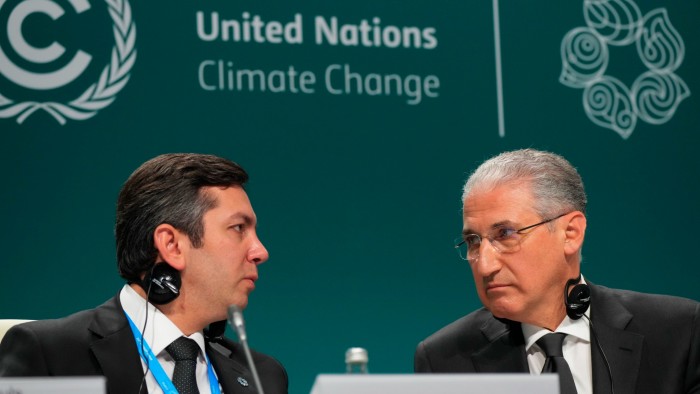Countries remained at loggerheads over climate finance, endorsement of the shift away from fossil fuels, and language about gender, in the final 48 hour stretch of the UN COP29 climate summit in Baku.
Most critically, the latest draft agreements released on Thursday failed to include a figure for a new global finance goal, leaving an ‘X’ in the document, as wealthy and poorer nations argued over basics such as a total sum, how it should be structured and who should pay.
Many of the key elements in the documents remained in brackets, to indicate a lack of agreement, despite ministers from a wide range of countries working in pairs to get consensus on the agenda items.
The European commissioner for climate action, Wopke Hoekstra, said the drafts were “clearly unacceptable as it stands now”. Another negotiator from a developed country, who declined to be named, branded the documents “unimpressive”, and raised concerns about the lack of focus on the transition away from fossil fuels, another key battle.
Rob Moore, former UK lead finance negotiator, now at think-tank E3G, said the finance draft text mapped out the various views of developed and developing countries.
“The lack of a compromise proposal and any numbers leaves negotiators with a huge amount of progress to make over the next day or two and the road to agreement will need to see rapid and candid engagement, with numbers on the table,” he said.
There were options to close the gap, Moore added. “The inclusion of a review mechanism might offer a bridging mechanism if countries can’t agree a goal that fully meets the needs of developing countries this COP.”
Many developing countries have called for a finance target of at least $1tn, but people familiar with discussions said a base of about $200bn-$300bn seemed most likely. The commitment to a new amount was set down in the Paris Agreement, and replaces a previous $100bn goal.
But several developing countries were scathing about a sum set so low. Africa group of countries chair, Ali Mohamed, described a $200bn target as “a joke”, and Bolivia’s representative said it was “unfathomable”.
“It has to be a bigger number so that it can really assist the developing countries,” Nik Nazmi Nik Ahmad, Malaysia’s minister of natural resources and environmental sustainability, told the Financial Times.
Several people familiar with discussions said the EU and other developed countries were not in agreement about the amount.
Some frustrated negotiators lashed out at the COP presidency held by Azerbaijan, which was “finding it hard to take the position of organiser, to show leadership, it has confused objectives”, one person said.
Michael Jacobs, a former adviser to UK prime minister Gordon Brown and senior fellow at think-tank ODI Global, was more optimistic, saying it was part of “an endgame”. “There remains a lot of anger and frustration among developing countries about this, but a path to a conclusion is beginning to open up.”
During the past nine days, countries have also clashed over how to take forward last year’s agreement from COP28 to transition away from fossil fuels, with the EU, the US, smaller islands and others pushing back against a block of oil and gas producers led by Saudi Arabia.
The draft on ambitions to cut emissions noted the global heat record set last year with “serious concern” but made no mention of the agreement at last year’s COP to transition away from fossil fuels.
A fight over women’s rights and gender issues has also escalated at the UN summit, after the Vatican, Saudi Arabia and others pushed for language relating to gender to be replaced by the mention of sex. The debate risked derailing efforts to update a UN action plan to make sure that climate change action took account of women, who are disproportionately affected.
The latest draft retained the use of gender, after EU commissioner Hoekstra said on Wednesday that the EU would “do all we can to get 21st century language on gender and equality” into the agreement.
The draft agreement on carbon trading suggested countries were considering a compromise on contentious issues, including the scope of an international registry maintained by the UN.
An independent financial report published last week indicated the initial $100bn goal would need to triple to at least $300bn as part of efforts to meet global climate financial needs.
It said developing countries, excluding China, needed $2.4tn in climate finance by 2030, with $1.4tn coming from domestic sources and $1tn from international finance, made up of $500bn in private investments, with further contributions from multilateral development banks, public grants and other sources.
Developed countries have yet to put forward a figure, beyond arguing they will provide more than $100bn so long as countries such as China, Qatar, Saudi Arabia and the United Arab Emirates also contribute. China was seen as providing some reassurance last week, when it gave details for the first time of its near-$25bn in climate finance contributions over recent years.
But Middle Eastern countries have indicated they are unwilling to pay in, setting the scene for a testy few days in Baku, according to people familiar with discussions.
Some countries emphasised the need to understand types of finance included in the goal, after questions about whether it should focus on grants, or mobilised finance from multilateral development banks, or other sources.
“One way to sort of think about it as a basket of goods, you need to know what’s in your basket before you know what it adds up to in terms of the total cost,” New Zealand’s climate minister Simon Watts told the FT.
Read the full article here

